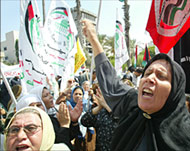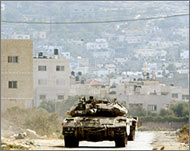Palestinians split on ‘armed Intifada’
The Palestinian Intifada, or uprising for statehood, is now in its fourth year, but Palestinians themselves remain divided over what form it should take.

Unlike the previous Intifada (1987-1992), in which mass demonstrations and stone throwing at the Israeli occupying military were the chief means of protest, the ongoing al-Aqsa uprising looks more like an armed insurrection.
It has provoked a concerted and draconian Israeli response, resulting in the killing and maiming of thousands of Palestinians, most of them civilians.
Eventually, the Israeli army reoccupied the West Bank and much of the Gaza Strip, ravaging the Palestinian civilian infrastructure and reducing Palestinian population centres to huge detention camps.
Furthermore, the “militarising” of the Intifada created a false impression in much of the world of a certain symmetry between Israel and the Palestinians, giving Israel a free hand to torment and gang up on the essentially unarmed and unprotected Palestinian population.
‘Grave blunder’
The severity of the Israeli response prompted many Palestinian intellectuals and public leaders to question the wisdom of the use of firearms and other violent actions, especially the human bombings or “martyrdom operations”, against Israel. They also believe the situation has been made worse by the US grouping the Palestinian national struggle within its definition of “global terror”.
Nabil Amr, minister of information in the previous Palestinian government, is one of the main advocates of demilitarising the Intifada.
“I think it was a grave blunder. It set us back many years and gave Israel the justification it wanted to decimate the Palestinian Authority and commit untold crimes against our people.”
Amr argues that the Palestinian people and their cause could have gained more by employing non-violent means.
 |
|
Others say peaceful demonstrations are the way |
“Militarising the Intifada neither protected us from Israeli savagery nor enhanced our image in the international arena. On the contrary, it gave Israel additional ammunition to destroy us and vilify us as terrorists in the eyes of the world.”
He points out that it was imperative that the Palestinians stop acting like (former Iraqi Minister of Information Muhammad Said) al-Sahaf who misled Arab public opinion into thinking that the Saddam Hussein regime was capable of effectively resisting the Anglo-American armies invading Iraq.
“We have to be realistic and refrain from indulging in futile rhetoric. I believe that with a combination of non-violent resistance and an internationally-acceptable political posture, we can gain more,” he says.
Like most Palestinian leaders, Amr realises that unmitigated Israeli aggression makes it very difficult for the Palestinians not to react to Israeli violence in kind.
However, he argues that Israeli provocations should not make the Palestinians swerve from their strategic goals.
“We must not allow Israel to decide our actions and agenda. We must pursue our political goals irrespective of Israeli provocations. It is not enough to be right; one has to be wise as well.”
Hamas disagrees
While Amr calls for a violence-free Intifada, Hamas represents the antithesis of his thinking.
Abd al-Aziz al-Rantisi, who escaped an Israeli attempt on his life in June, says the Palestinians have no other choice but to keep up the armed struggle.
“There is no instance in the history of nations where a people under occupation are asked to accommodate the whims and misgivings of the occupying power,” says al-Rantisi.
Al-Rantisi, one of the most hawkish figures within Hamas, argues that it would be illogical for the Palestinians to stop resisting especially as long as Israel shows no sign of stopping its aggression.
He cited the 45-day hudna or cease-fire, unilaterally declared by Palestinian resistance groups in coordination with the Abbas government in summer.
 |
|
Al-Rantisi says Intifada must be an armed struggle |
“We meticulously observed the ceasefire, but Israel continued the assassinations and killings. So, what are we supposed to do in this case: allow them to slaughter us like sheep?”
Al-Rantisi disagrees with the notion that the Palestinians could recover their rights through non-violent means.
“Tell me of one nation in modern history that gained its independence without armed struggle. If Algerians had adopted this defeatist thinking, they would have remained under French colonialist rule.”
Non-conformist voices
Some Islamist leaders disagree with al-Rantisi, at least for tactical reasons.
Nizar Ramadan is a Palestinian writer and journalist from Hebron who was recently released from an Israeli jail, having served more than 16 months of imprisonment for “incitement” against the Israeli occupation.
He says the armed Intifada made the world think, “We are an army facing another army.”
“The use of firearms in the Intifada blurred and nearly obliterated a central fact of our struggle, namely the fact that we are a defenceless people languishing under a sinister military occupation and struggling to end it.
“So instead of viewing reality as it is, a strong army brutalising and ganging up on a defenseless population, the world, or the bulk of it, came to view the Intifada as a classical military confrontation between two armed forces, which, of course, is not true.”
Israel to blame
Most Palestinian intellectuals and pundits agree that Israel is primarily responsible for pushing the Palestinians to resort to the use of firearms and bomb attacks.
 |
|
Israel’s military action continued through a Palestinian ceasefire |
One of those is former Palestinian Minister of Labour, Ghassan al-Khatib.
In an interview with Aljazeera.net, al-Khatib made it clear that the Palestinians had no choice, but to react to “excessive Israeli atrocities.”
He attributes the militarising of the Intifada to two main reasons: the excessive use of force by Israel against largely peaceful Palestinian demonstrations, and the increasing availability of firearms to the Palestinians.
Moreover, he affirms that the al-Aqsa Intifada began as essentially a popular uprising, not an armed insurrection.
Al-Khatib points out that in the first ten days of the Intifada, Israel killed a hundred Palestinian civilians, an average of 10 people per day, in addition to 13 other Palestinians in Israel proper.
“Those people didn’t carry arms, they were not on their way to carry out bomb attacks, they were only taking part in largely peaceful demonstrations, and only a few were throwing stones. Nonetheless, Israeli soldiers were ordered to shoot and kill those people,” he says.
Al-Khatib also says that the first bomb attack in the Intifada did not take place until after six months from its outbreak in September 2000.
“All of this shows that Israel drove us to resort to the armed Intifada,” he says.
Al-Khatib concludes that demilitarising the Intifada could not possibly be done without some cooperation from the other side, Israel.
“You just can’t ask people to not use arms and violence when they are constantly killed and their homes are destroyed. Every action has a reaction.”